|
| |
This week in: Peace & Security Publications |
IPSI | Africa | Americas | East Asia | Europe & Central Asia | Middle East | South Asia
|
|
|
|
| |
This week in Peace & Security Publications
|
|
|
|
| |
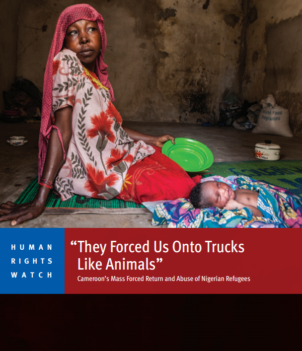
HRW: Since early 2015, the Cameroonian authorities have summarily deported at least 100,000 Nigerians living in remote border areas back to war, displacement, and destitution in Nigeria’s Borno State. At least 4,402 are known to have been…
|
|
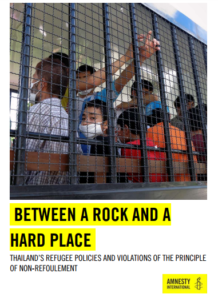
Amnesty International: This report describes the shortcomings of Thailand’s policies towards refugees and asylum-seekers as well as its violations of the principle of non-refoulement. The principle of non-refoulement obliges states not to return anyone to a territory where they would be at risk of…
|
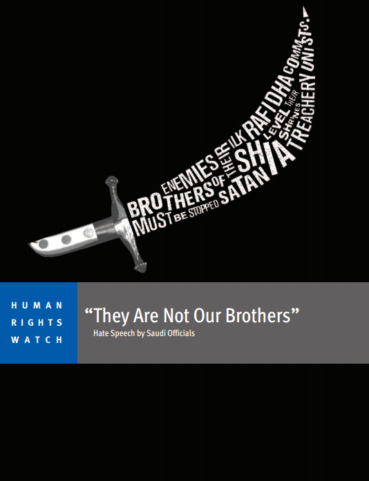
HRW: The Saudi-sponsored “purist” Islamic belief and practice has influenced Muslims across the globe, but it is by no means uncontested. Many Sunnis regard this form of Islam as intolerant and…
|
|
|
|
|
|
| |
This week in Sub-Saharan Africa
|
|
|
|
| |
ANGOLA: Outgoing leader and his family still cling to power as new President is sworn in after 38 years
| |
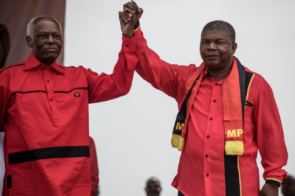
|
On Tuesday, following an election last month, former Defense Minister João Lourenço was sworn into office. Before stepping down, former President Jose Edwardo Dos Santos passed decrees shoring up his power and leaving doubts about how much room the new president will have to maneuver. The new president vowed to rebuild an economy devastated by falling oil prices, fight corruption, and tackle gaping inequality in Africa’s second-largest oil producing country. Dos Santos remains head of the ruling MPLA party, giving the veteran leader influence over key policy decisions. Comment: Dos Santos created a new position for himself, “President of the Republic Emeritus Honorary,” which gives him and close family members immunity from prosecution. He signed a decree freezing appointments in the military, security agencies, and for the intelligence chief until 2025, ensuring his close circle retains control. He also promoted 165 senior police commanders. (The Citizen, France24, Los Angele Times, Reuters)
|
|
|
|
|
| |
KENYA: Deep divisions over plan to change election law
On Thursday, Kenya’s ruling Jubilee Party presented Parliament with proposals to prevent the Supreme Court from annulling the results of an upcoming re-run presidential election in an attempt to prevent a repeat of the outcome of the contested election in August. The re-run vote is scheduled for October 26, and opposition challenger Raila Odinga said his coalition will not take part unless the proposed changes are dropped, calling the new vote “sanitization of the flaws” of the August 8 vote. The Jubilee Party’s proposed amendments to the election laws would stop the court from invalidating results if the electronic transmission fails again in the future, and that the manually transmitted results would be final. Comment: Kenya used two systems to transmit results from polling stations: paper forms and the electronic transmission of vote tallies, plus scanned copies of the forms. The court found flaws in both, and as a result struck down President Uhuru Kenyatta’s poll victory. (Independent, News24, Reuters)
|
|
|
|
| |
UGANDA: Fistfights erupt in parliament amid move to extend Museveni rule
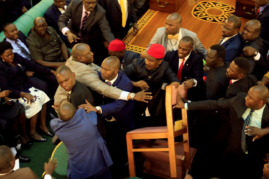
|
|
On Tuesday, a brawl erupted in Uganda’s parliament ahead of the debate on whether to grant long-serving President Yoweri Museveni another term in office. The proposal, echoing steps by other veteran African leaders to avoid legal limits on their rule, has stirred widespread resistance from civil rights activists’, opposition parties, religious leaders, and even some members of Museveni’s ruling party. At least 25 Members of Parliament opposed to the proposed constitutional amendment to prolong Museveni’s tenure were forcibly ejected on orders of the speaker for involvement in fighting. All other like-minded MPs then walked out. Comment: Under the existing constitution, a person standing for president must be under 75 years of age. Museveni, 73, is currently unqualified to seek re-election at the next polls in 2021. Removing the age cap would erase that barrier. Museveni has been in power since 1986, and is increasingly accused of authoritarianism and failure to curb corruption. (Daily Nation, ABC News, Reuters)
Researched/Written by Brian Adienge
|
|
|
|
|
| |
This week in the Americas & Caribbean
|
|
|
|
| |
CHILE: Protests break out in capital city
On Tuesday, protesters and law enforcement clashed in Santiago as demonstrations in support of four Mapuche Indigenous prisoners became violent. Protesters demanded freedom for the four prisoners, who were accused of conducting arson attacks in southern Chile. Demonstrations included blocking traffic on main roads and setting vehicles on fire to raise awareness; the four prisoners have been on a hunger strike for the last 113 days. Comment: The Mapuche is the largest Indigenous group in Chile; the group commonly clashes with the Chilean government over ancestral grounds and rights of autonomy. (TeleSur, The Santiago Times, Insurrection News)
|
|
|
|
|
| |
VENEZUELA: U.S. adds country to extended travel ban, targets government officials and families
On Sunday, President Donald Trump extended the travel ban to include Chad, North Korea, and Venezuela from a proposed lack of security and anti-terrorism protocols. Venezuelan Foreign Minister Jorge Arreaza condemned the new travel ban and accused the United States of imposing “psychological and political terrorism” onto the country. Arreaza stated that the extended travel ban on the country is a forceful tactic by the Trump Administration to shift the country in an “undemocratic” way. Comment: Diplomatic relations between Venezuela and the U.S. have been tense the last few months, especially with the recent sanction against President Nicolas Maduro over “democratic failures.” In addition to U.S. persons and companies being banned from conducting business with Venezuela, Canada and Spain are also imposing sanctions against the country. (El Universal, BBC News, Bloomberg, Reuters, The Independent)
|
|
|
|
|
| |
VENEZUELA: Opposition refuses to hold conversation with government
On Tuesday, the opposition Democratic Unity Table stated they will not meet with any government officials until the October 15 regional elections are held. The opposition group stated that their demands have not been met in regards to human rights and elections. Dominican Republic President Danilo Medina, and Spain’s former President Jose Luis Rodriguez Zapatero are mediating between the two groups. Comment: While Venezuelan President Maduro has been open to talks with the opposition, the Democratic Unity Table believes continuing talks with the government will distract from the country’s economic crisis. Last year, the Holy See attempted to assist in brokering negotiations between the opposition and the Venezuelan government, but the negotiations fell through due to lack of progress. (TeleSur, El Nuevo Herald, Reuters)
Researched/Written by Blessing Ikpa
|
|
|
|
|
| |
This week in East Asia & Pacific
|
|
|
|
| |
CAMBODIA: UN Special Rapporteur urges the country to embrace human rights and democracy
On Thursday, UN’s Special Rapporteur on Cambodia, Rhona Smith, released a report urging Cambodia to ensure democratic freedoms and human rights, leading to a fair election in July 2018. Primary concerns outlined in the report include democratic free space and freedom of expression, especially after the closure of Cambodia Daily and the National Democratic Institute in Cambodia. Comment: This report also responds to the recent arrest of Kem Sokha on September 3, who was arrested without a warrant after accusations against the government. (Phnom Penh Post, VOA Cambodia, Radio Free Asia)
|
|
|
|
|
| |
JAPAN: Prime Minister Shinzo Abe dissolves Parliament for snap election on October 22
On Thursday, Prime Minister Shinzo Abe dissolved the Parliament and will hold snap elections on October 22. PM Abe’s Liberal Democratic Party will compete against the newly founded Kibo No To Party. PM Abe expedited the original election in December 2018 to propose a reallocation of tax revenue of 50-50 split between debt and social security issue as well as continuing to pressure North Korea. Comment: Analysts believe that PM Abe is capitalizing on support ratings and political legitimacy in order to remain in power. (Strait Times, Bloomberg, Reuters)
|
|
|
|
|
| |
MALAYSIA: Citizens banned from travelling to North Korea
On Thursday, Malaysia’s Ministry of Foreign Affairs announced that citizens are banned from travelling to North Korea until further notice, due to escalating tensions on the Korean Peninsula and increasing development of missiles by North Korea. According to the Ministry of Foreign Affairs, the ban will be lifted once everything “returns to normal”. Comment: This ban comes after Singapore issued a travel ban to North Korea on September 6. The ban also caused a soccer match in Pyongyang to be postponed for the third time. The Malaysian Association of Tour and Travel Agents said the travel ban would not have a significant effect on Malaysians. (Kyodo News, Malay Mail Online, Channel News Asia, Reuters)
Researched/Written by Rabia Uddin
|
|
|
|
|
| |
This week in Europe & Central Asia
|
|
|
|
| |
AZERBAIJAN: Officials in Azerbaijan target the LGBT community with arrests
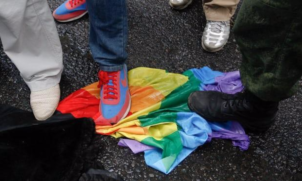
|
|
On Friday, Azerbaijani LGBT advocacy organization Nefes LGBT Azerbaijan Alliance, posted a Facebook live video in which they accused the police in the capital of Baku of targeting gay and transgender people for arrests, extended imprisonment times, and torture. Activists and news agencies estimate that up to as many as 100 people have been targeted in Baku alone since the beginning of September. While advocacy organizations are claiming that these arrests are based solely on the sexual orientation and gender identity of those arrested, Azerbaijani officials have said that only prostitutes, not those in the LGBT community, have been arrested after the police received complaints in the downtown neighborhoods. A Ministry of Internal Affairs representative told media sources that, “In our country, sex minority members have never been persecuted. However, they are not exempt from liability for unlawful acts. Recently, people of non-traditional sexual orientation engaged in prostitution regularly gather in central city and violate public order.” Comment: In 2016, the ILGA-Europe Rainbow Index ranked Azerbaijan as the worst place to be gay in Europe after a review of their laws, policies and practices that impact the LGBT community. This ranking came after the European Parliament condemned the country in 2015 for the “intimidation and repression” of LGBT people. (NBC News, Caucasian Knot, Eurasia Net)
|
|
|
|
|
| |
MACEDONIA: Macedonian leaders speak to the future of Macedonia-NATO relations
On Wednesday, Macedonian Foreign Minister Nikola Dimitrov and Deputy Prime Minister and Defense Minister Radmila Šekerinska met with NATO Deputy Secretary General Rose Gottemoeller to discuss the integration of Macedonia as the security organization’s 30th member state. The discussion included stability and security efforts in the Western Balkans, the political climate in Macedonia’s capital of Skopje, and the Macedonian government’s commitment to reaching their military requirements for consideration as a member state. Foreign Minister Dimitrov pledged an increase in the country’s military expenditure to NATO’s required 2 percent of GDP and an increase in the number of troops they will be contributing to the NATO mission in Afghanistan. Secretary Gotemoeller acknowledged the new government’s commitment to NATO and encouraged continued cooperation in the region. Comment: A long-standing dispute between Macedonia and Greece regarding Macedonia’s name has slowed the country’s acceptance into NATO. However, the new Social Democratic SDSM and Albanian DUI coalition government, under Prime Minister Zoran Zaev, has sought to strengthen ties between Macedonia and its neighbors, primarily, Bulgaria and Greece. (Radio Free Europe, European Western Balkans, NATO)
|
|
|
|
|
| |
RUSSIA: Defense Ministry reports testing of new intercontinental ballistic missile
On Tuesday, Russia’s Defense Ministry confirmed the testing of the new Topol RS-12M intercontinental ballistic missile (ICBM) as a part of larger military drills this week. The ICBM was fired from the Kapustin Yar state central range in the Astrakhan region and hit its target at the Sary-Shagan range in Kazakhstan. This launch sought to test a newly advanced warhead on the Topol RS12M, in addition to finding ways to develop Russian weapons to breach “enemy” missile defense systems. Comment: This missile test coincided with Russian military exercises in Siberia that involved approximately 4,000 troops and tested the Yars missile launcher. Just a week ago Russia conducted their largest military exercises since the Cold War with Belarus. (Radio Free Europe, Sputnik International, TASS)
Researched/Written by Amy Pipher
|
|
|
|
|
| |
This week in the Middle East & North Africa
|
|
|
|
| |
IRAQ: Ninety-two percent of Iraqi Kurds vote for an independent Kurdistan amid standoff with Baghdad
| |
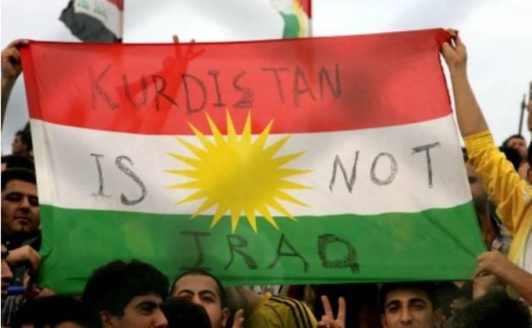
|
On Wednesday, the Kurdish region’s election commission told a press conference that more than 92 percent of voters approved independence for the autonomous region, with a voter turnout of more than 72 percent. The three provinces of the semi-autonomous Kurdish Region (KRG), as well as areas under Kurdish control since fighting broke out against the self-proclaimed Islamic State (IS) voted in the referendum. Iraqi Prime Minister Haider al-Abadi demanded that foreign governments close their diplomatic missions in the Kurdish capital of Erbil and that the Kurdish government relinquish control over their international airports. The Kurdish government responded that the referendum only opens up a dialogue with Baghdad, and that they would not relinquish control over their airports. Comment: The Kurdish Regional Government announced a referendum for independence from Baghdad earlier this year, resulting in hostile opposition from the international community fearing that independence would disrupt the region and hinder the fight against IS. Turkey and Iran threatened sanctions against the Kurdish government should they continue to seek independence. (Kurdistan24, AP, News Nation, Reuters)
|
|
|
|
|
| |
SAUDI ARABIA: Kingdom threatens diplomatic fallout if UN probe into Yemen passes
On Tuesday, two as-yet unnamed Western diplomats confirmed Saudi Arabia sent a threatening letter to their governments over the UN Human Rights Council resolution calling for an international and independent investigation into war-torn Yemen. The letter indicated that adopting the proposal could “negatively affect” diplomatic and economic ties with their countries. The international commission of inquiry proposed by the Netherlands and Canada has the support of the UN High Commissioner for Human Rights, Zeid Ra’ad Al Hussein, as well as from the Chinese delegation, while Saudi Arabia and its Arab allies are pushing for a rival resolution proposing a domestic investigation lead by the Saudi-backed government. After the Associated Press released this story, Saudi Arabia announced they will allow women to drive within one year. Comment: Saudi Arabia is leading an international coalition battling the Iranian-backed Houthi movement in Yemen. The two-and-a-half-year war has depleted Yemen’s social services, resulting in widespread famine, displacement, and a massive cholera outbreak in what is being considered the worst humanitarian crisis today. To date, there are more than 50,000 casualties, 650,000 cases of cholera with 2,300 associated deaths and 400,000 children aged five and under who are dangerously malnourished. (AP, Independent, Quartz, Reuters)
|
|
|
|
|
| |
SYRIA: U.S.-backed alliance alleges Russia bombed their fighters in eastern Syria
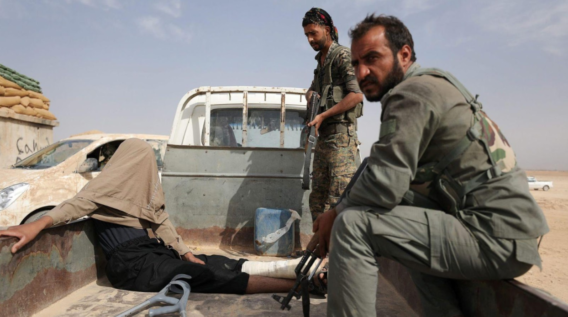
|
|
On Monday, the U.S.-backed Syrian Democratic Forces (SDF), an alliance of Kurdish and Arab militias, said Russian fighter jets attacked their position in the Conoco gas field in the eastern Deir-al Zour province, killing one and wounding two others. Conoco gas field is Syria’s largest gas field which SDF captured from the self-proclaimed Islamic State (IS) on Saturday. Russian Maj.-Gen. Igor Konoshenkov denies the attack, while the American spokesman for the U.S.-led coalition Col. Ryan Dillon says rounds hit their positions but could not confirm Russia’s involvement. Comment: SDF and Russian-backed Syrian troops are waging separate offensives against IS along opposite banks of the Euphrates River in Deir al-Zour. SDF forces claim this is not the first-time Russian forces attacked them, as each side is racing to defeat IS militants and secure oil and gas fields, sparking concerns of conflict between each side and their superpower sponsors. (Haaretz, New York Times, AP, Reuters)
Researched/Written by Zachary Libow
|
|
|
|
|
| |
BANGLADESH: Government requests concrete plan from UN Security Council for Rohingya Crisis
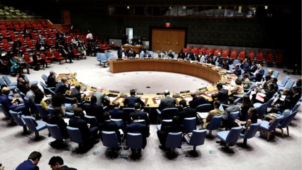
|
|
On Wednesday, Bangaldesh’s foreign minister briefed UN Security Council members on the Rohingya crisis ahead of Thursday’s UNSC meeting, requesting that strong steps be taken to resolve the conflict and return the refugees to Myanmar. During Thursday’s UNSC meeting, Security Council members commended Bangladesh for it’s efforts, and UN Secretary-General urged the government of Myanmar to cease all military options, “allow unfettered access to those in need, and ensure the safe and voluntary return of displaced Rohingya to their homes.” Comment: Also on Wednesday, the World Bank announced it was ready to assist Bangladesh in addressing the refugee crisis as soon as an official request is issued through the Economic Relations Division under the finance ministry. The International Organization for Migration estimates that there are more than 800,000 Rohingya refugees in Bangladesh, and at least 20,000 more have entered this week alone. Many Security Council members called for increased efforts to end Rohingya persecution, but no concrete resolutions were generated. (Daily Star, Prothom Alo 1, 2, 3, The Independent, United Nations)
|
|
|
|
|
| |
INDIA: Government will not deploy troops to Afghanistan; will contribute other aid
On Tuesday, Indian Defense Minister Nirmala Sitharaman announced in a joint press conference with U.S. Defense Secretary James Mattis that although India will continue providing aid for development, security, and medical assistance in Afghanistan, no troops would be deployed. Secretary Mattis also met with National Security Adviser Ajit Doval and spoke with Prime Minister Narendra Modi to discuss Indian-U.S. bilateral engagement and the countries’ “shared priorities for peace, stability and combating terrorist” in the region. Comment: Secretary Mattis, the first member of President Trump’s Cabinet to visit India, met with officials to gain support for President Trump’s new Afghanistan policy. India’s refusal to get involved in Afghanistan militarily may be a diplomatic move to preserve peace with Pakistan. (The Hindu, Hindustan Times, The News, DW, Reuters)
|
|
|
|
|
| |
SRI LANKA: Buddhist monks lead attack against Rohingya refugees at UN safe house
On Tuesday, a mob led by a group of nationalist Buddhist monks attacked a UN safe house in Colombo where 31 Rohingya refugees, including 16 children and seven women, were being sheltered. The incident, recorded and shared via social media by a monk who is a member of the Sinhalese National Force, involved the mob throwing stones at the UN building before breaking in and destroying windows and furniture. Officials relocated the refugees and are currently housing them in the same maximum-security prison where Sri Lanka detains many of its terrorism suspects. Comment: On Wednesday, the Sri Lankan government condemned the attacks and the nationalist Buddhist monks responsible for inciting the violence, as well as promised disciplinary action against the perpetrators. The UNHCR released a statement Wednesday expressing concern, urging “the public and all those concerned with refugees to continue extending protection and to show empathy for civilians fleeing persecution and violence.” The nationalist Buddhist monks in Sri Lanka have ties to nationalist counterparts in Myanmar, and both groups have been accused of inciting attacks on Muslims. (Daily Times, The Hindu, Japan Today, Straits Times, Reuters)
Researched/Written by Natalie A. Landau
|
|
|

|
|